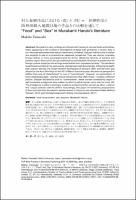Chapter 村上春樹作品における〈 〉と〈性〉– 初期作品と阪神淡 大 地 以後の作品との比 を して / “Food” and “Sex” in Murakami Haruki’s literature
Abstract
Murakami’s early writings are littered with names of various foods and dishes. Often appearing in the context of descriptions of dates with girlfriends or lovers, they in turn become associated with sexual interactions. However, they are not the sorts of dishes one expects to see in a conventional Japanese household. They are almost invariably foreign dishes or mere accompaniments for drinks. Whilst the famines of wartime and postwar Japan did much to disrupt traditional household diets, Murakami’s predilection for foreign cuisine distances his writings even further from Japanese territory. This tendency is particularly evident in his early works.As has been well documented, following his eight-year sojourn abroad, the Great Hanshin Earthquake of January 1995, and the sarin gas attacks by the Aum Shinrikyo on the 20th of March that same year, Murakami’s perspective shifted from one of ‘detachment’ to one of ‘commitment’. However, an examination of food-related passages—and the sexual interactions that often follow—reveals a different picture. Despite Murakami’s shift to ‘commitment’, these scenes consistently depict a self-contained protagonist who makes no effort to allow women entry into his inner life. The protagonist is either unwilling or unable to comprehend the woman-as-other, a stance that I argue persists until the 2010’s. Accordingly, this paper will examine juxtapositions of food and sex from Murakami’s earliest works to Onna no inai otokotatchi (Men Without Women, 2014) and Kishidanchōgoroshi (Killing Commendatore, 2017).


 Download
Download Web Shop
Web Shop